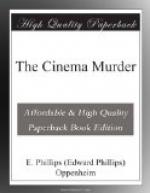CHAPTER IX
The slow fever of inaction, fretting in Philip’s veins, culminated soon after Martha’s departure in a passionate desire for a movement of some sort. The very silence of the room maddened him, the unresponsive-looking telephone, the fire which had burned itself out, the dropping even of the wind, which at intervals during the evening had flung a rainstorm against the windowpane. At midnight he could bear it no longer and sallied out into the streets. Again that curious desire for companionship was upon him, a strange heritage for one who throughout the earlier stages of his life had been content with and had even sought a grim and unending solitude. He boarded a surface car for the sake of sitting wedged in amongst a little crowd of people, and he entered his club, noting the number of hats and coats in the cloakroom with a queer sense of satisfaction. He no sooner made his appearance in the main room than he was greeted vociferously from half a dozen quarters. He accepted every hospitality that was offered to him, drinking cheerfully with new as well as old acquaintances. Presently Noel Bridges came up and gripped his shoulder.
“Come and have a grill with us, Ware,” he begged. “There’s Seymour and Richmond here, from the Savage Club, and a whole crowd of us. Hullo, Freddy!” he went on, greeting the man with whom Philip had been talking. “Why don’t you come and join us, too? We’ll have a rubber of bridge afterwards.”
“That’s great,” the other declared. “Come on, Ware. We’ll rag old Honeybrook into telling us some of his stories.”
The little party gathered together at the end of the common table. Philip had already drunk much more than he was accustomed to, but the only result appeared to be some slight slackening of the tension in which he had been living. His eyes flashed, and his tongue became more nimble. He insisted upon ordering wine. He had had no opportunity yet of repaying many courtesies. They drank his health, forced him into the place of honour by the side of Honeybrook, veteran of the club, and ate their meal to the accompaniment of ceaseless bursts of laughter, chaff, the popping of corks, mock speeches, badinage of every sort. Philip felt, somehow, that his brain had never been clearer. He not only held his own, but he earned a reputation for a sense of humour previously denied to him. And in the midst of it all the door opened and closed, and a huge man, dressed in plain dinner clothes, still wearing his theatre hat, with a coat upon his arm and a stick in his hand, passed through the door and stood for a moment gazing around him.
“Say, that’s Sylvanus Power!” one of the young men at the table exclaimed. “Looks a trifle grim, doesn’t he?”
“It’s the old man, right enough,” Noel Bridges murmured. “Wonder what he wants down here? It isn’t in his beat?”
Honeybrook, the great New York raconteur, father of the club, touched Philip upon the shoulder.




